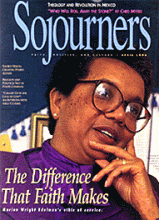Not in polite company. That’s where you were not supposed to talk about either politics or religion. Remember? Perhaps it was because these two subjects were too important and would interrupt the small talk. Or maybe because they were potentially so divisive that they might spoil the party.
Well, that has changed over the years. Both politics and religion are hot topics these days. But now the discomfort seems to be discussing them together.
I recall, painfully, being an evangelical teen-ager who was told by my church that Christian faith had nothing to do with either racism or war. (In truth, most of the good church people quietly supported both, succeeding in keeping their religion separate.) But my heart was rising to the moral challenge of the civil rights movement and the Vietnam war.
The intuition that my faith did indeed have something to do with "politics" was the principle cause of my separation from the little church that had nurtured and raised me. Now in exile, I found a new home in the black community and among the black churches. There I learned what the relationship between the two forbidden topics in polite white society really was.
The civil rights movement was built on the foundation of the black churches. The illuminating oratory of Martin Luther King Jr. and the other preacher-activists of the movement made the integral connection between faith and politics clear.
THE TOPIC HAS BECOME more complicated. The evangelical folks I grew up with finally became involved in politics, and now insist that faith indeed has real political implications. The issue that drew them in was abortion and the cultural breakdown of American society.
Read the Full Article
